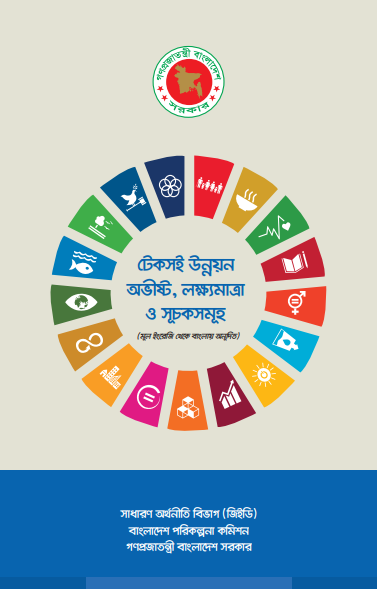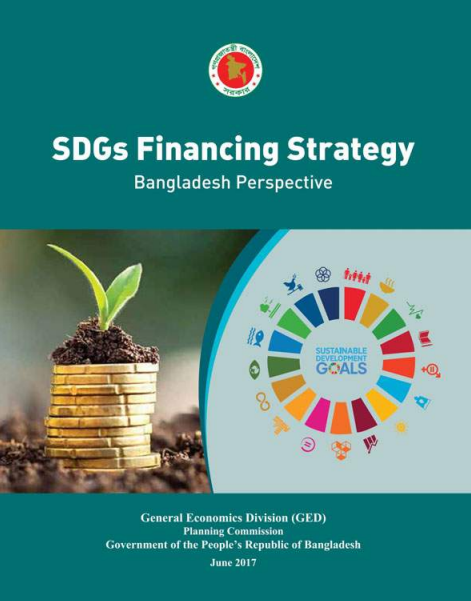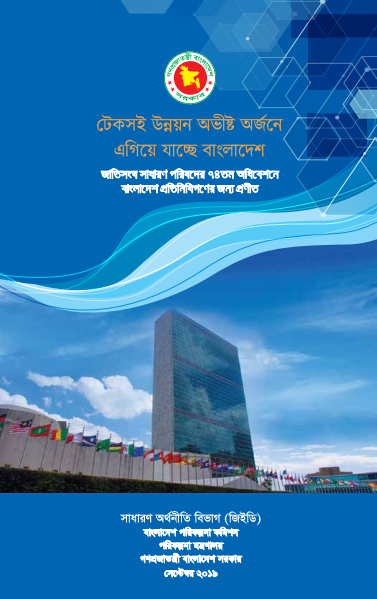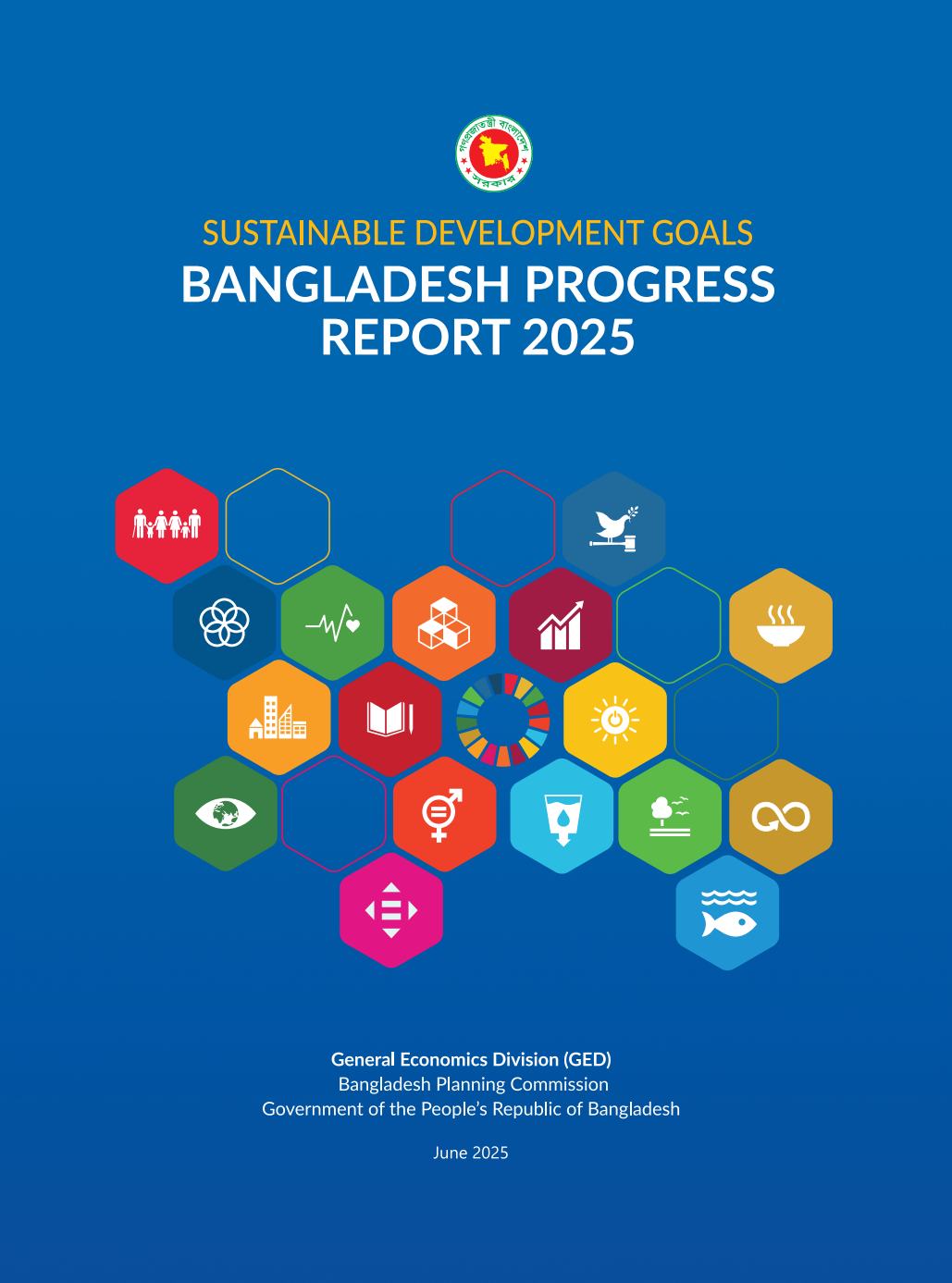
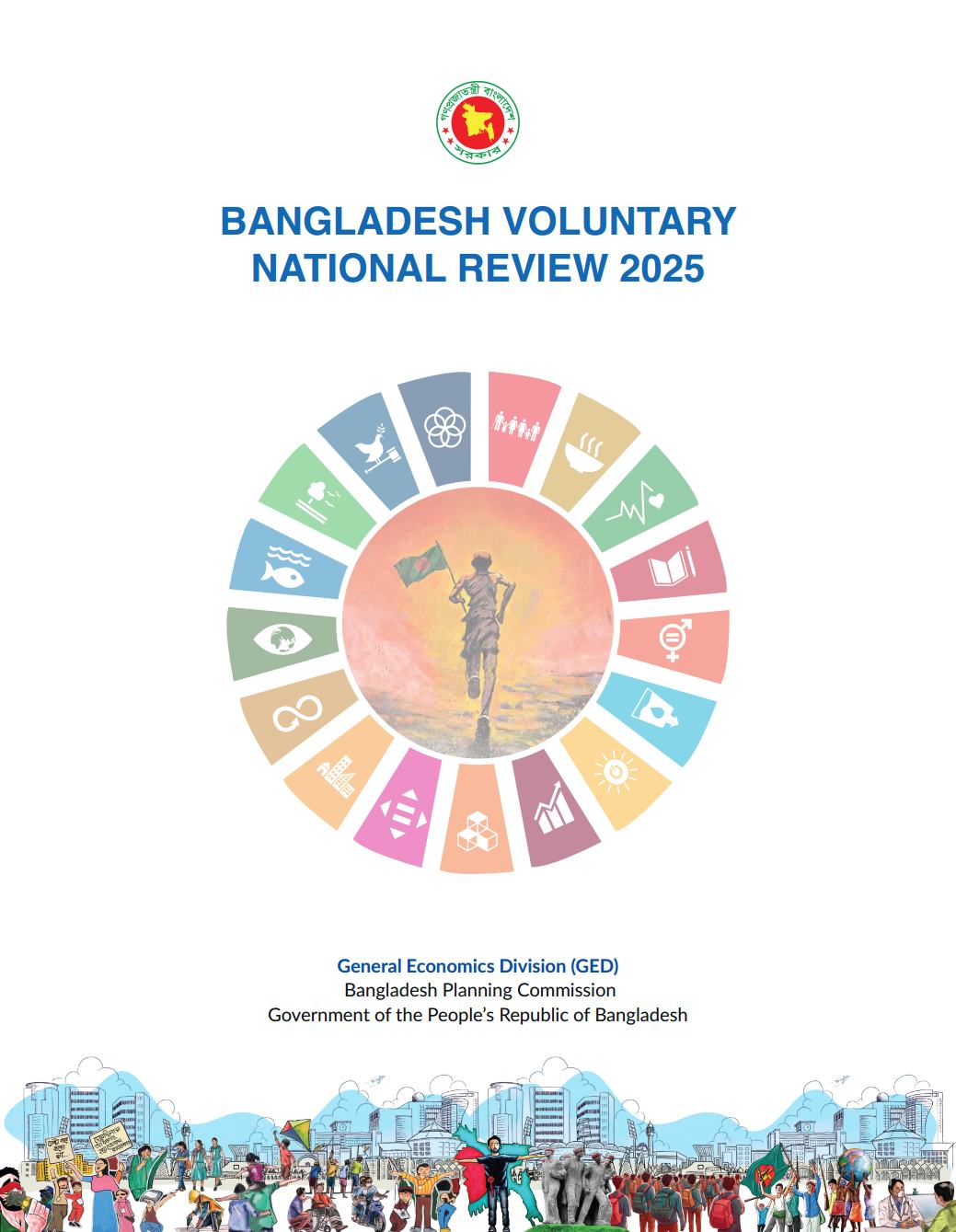
BANGLADESH VOLUNTARY NATIONAL REVIEW 2025
 July 14, 2025
July 14, 2025 The country’s progress towards accomplishing the Sustainable Development Goals (SDGs) is detailed in Bangladesh’s Voluntary National Review (VNR) 2025. The report, prepared during a period of institutional and political changes, demonstrates the country’s renewed and steadfast commitment to advancing the 2030 Agenda through evidence-based policymaking, inclusive governance, and participatory development. The VNR 2025 highlights the advancements, challenges, and significant changes that have taken place in the past few years.
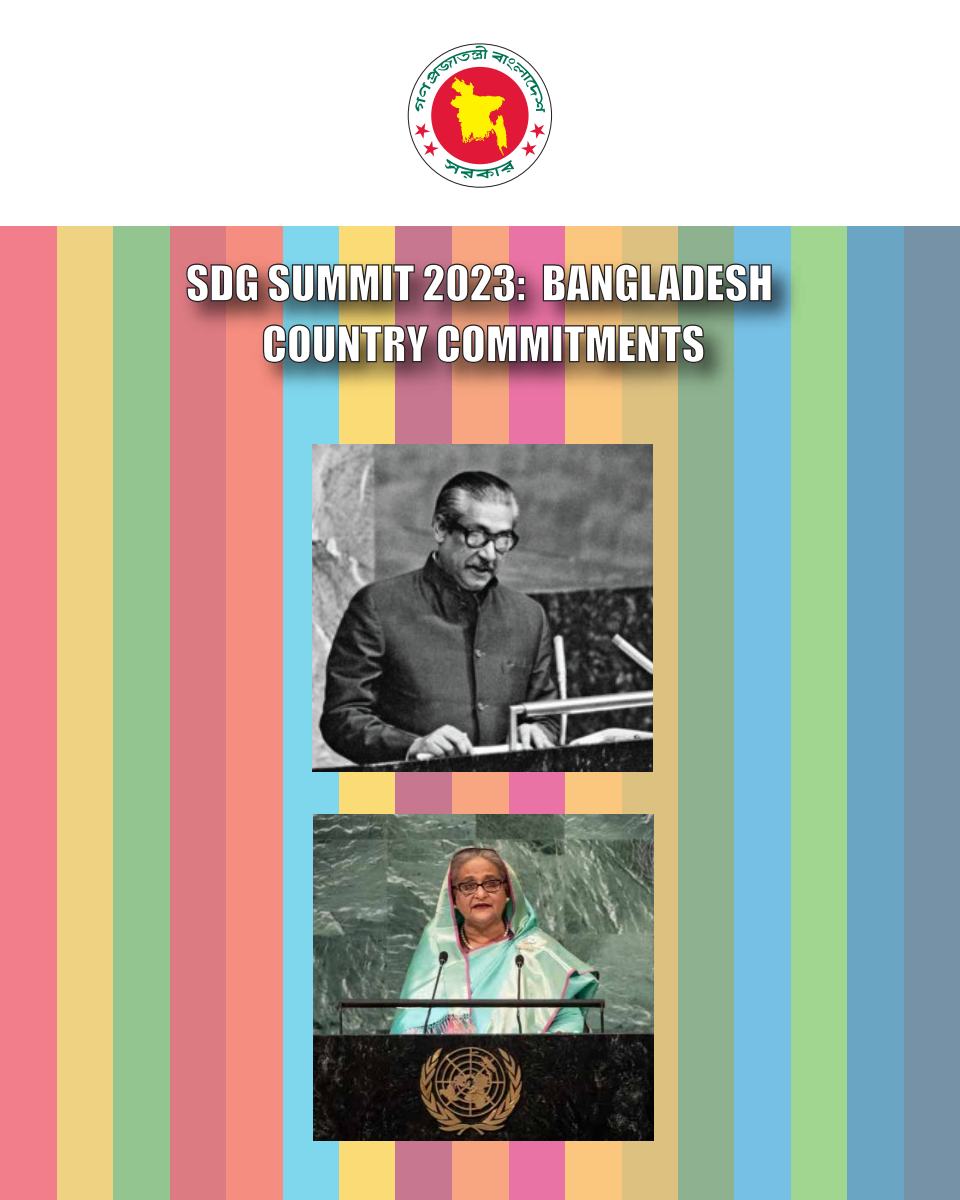
SDG SUMMIT 2023: BANGLADESH COUNTRY COMMITMENTS
 October 9, 2023
October 9, 2023 Bangladesh has wholeheartedly embraced the Sustainable Development Goals (SDGs), aligning them with its development agenda to prioritize the well-being of its people. The government has integrated the SDGs into its Eighth Five Year Plan (2021-2025), with 66 out of 104 monitoring indicators directly linked to the SDGs. This alignment reflects the values of its leaders, including Father of the Nation Bangabandhu Sheikh Mujibur Rahman and Prime Minister Sheikh Hasina, who emphasized similar themes during their United Nations speeches.
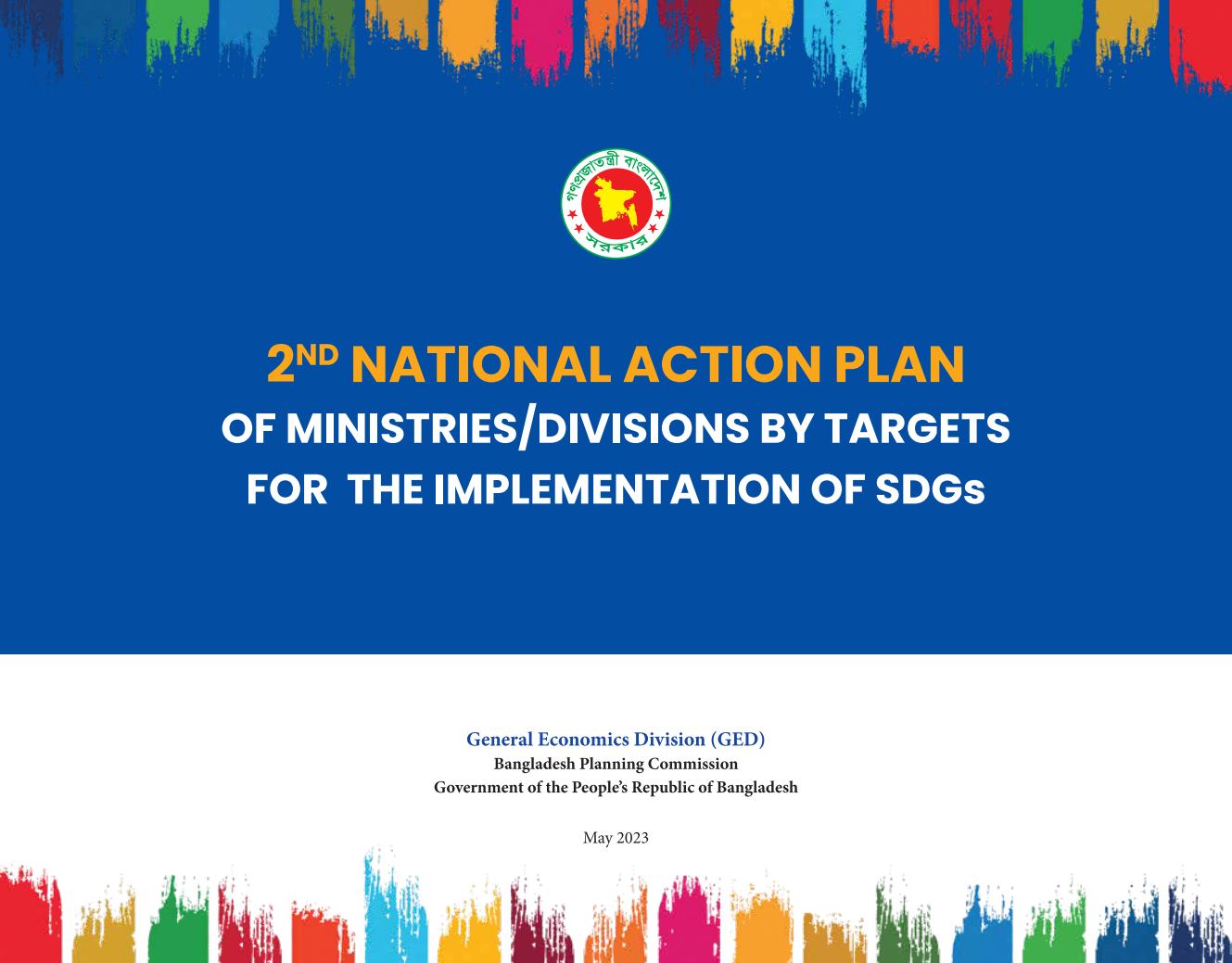
2nd National Action Plan of Ministries/Divisions by Targets for the Implementation of SDGs
 August 27, 2023
August 27, 2023 The ‘2nd National Action Plan of Ministries/Divisions by Targets for the Implementation of SDGs’ is a comprehensive strategy that encompasses the actions of various Ministers/Divisions identified in the SDGs Mapping Handbook. This Actin Plan is designed to effectively implement the goals and associated targets outlined in the SDGs, spanning three consecutive Five Year Plans (7th, 8th, and 9th FYP) in alignment with the Development Budgetary provisions of the Government of Bangladesh.
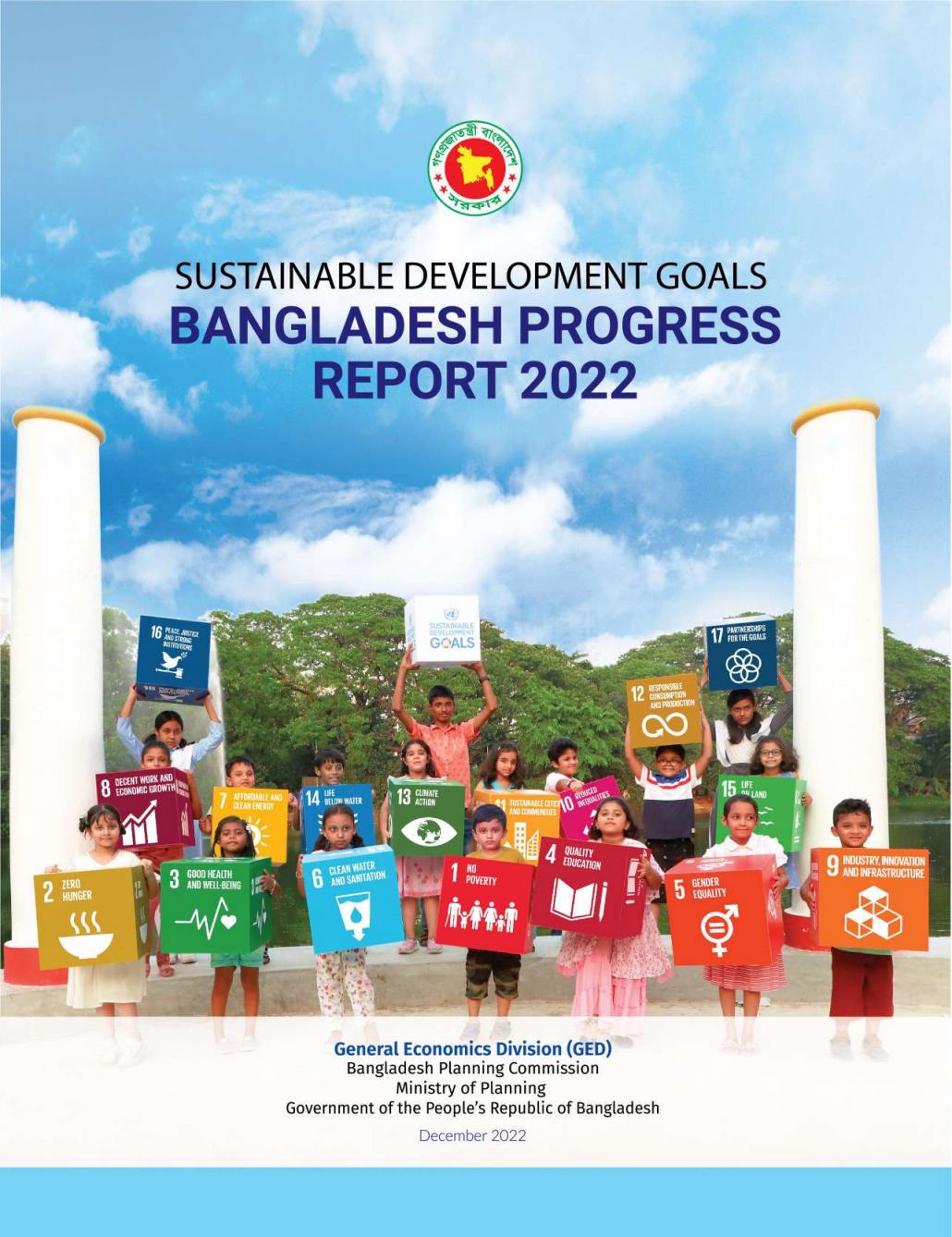
Sustainable Development Goals Bangladesh Progress Report 2022
 February 15, 2023
February 15, 2023 The Government of Bangladesh is striving towards the ambitious goal of reaching the furthest behind first, through adopting the ‘whole-of-society’ approach and implementing the ‘leaving no one behind’ agenda. Since 2020, the challenge of achieving the SDGs has been magnified by an increase in the frequency and intensity of human-made crises and natural disasters in the global economy, as well as the challenges of responding to the Covid-19 pandemic. Although the economy started to rebound in 2021, it slowed down again towards the end of the year due to new Covid-19 variants and continued global vaccine inequity, along with rising inflation, supply chain disruptions, policy uncertainties, and the global impact of the Russia-Ukraine war. The Sustainable Development Goals Bangladesh Progress Report 2022 provides an analysis of progress on 17 SDGs and 169 targets in Bangladesh where there are unique challenges, resources, and opportunities for progress. The report also provides an analysis of data gaps that constrain the monitoring of progress along with potential sources and priority areas that the government is exploring for enhancing SDG data availability.
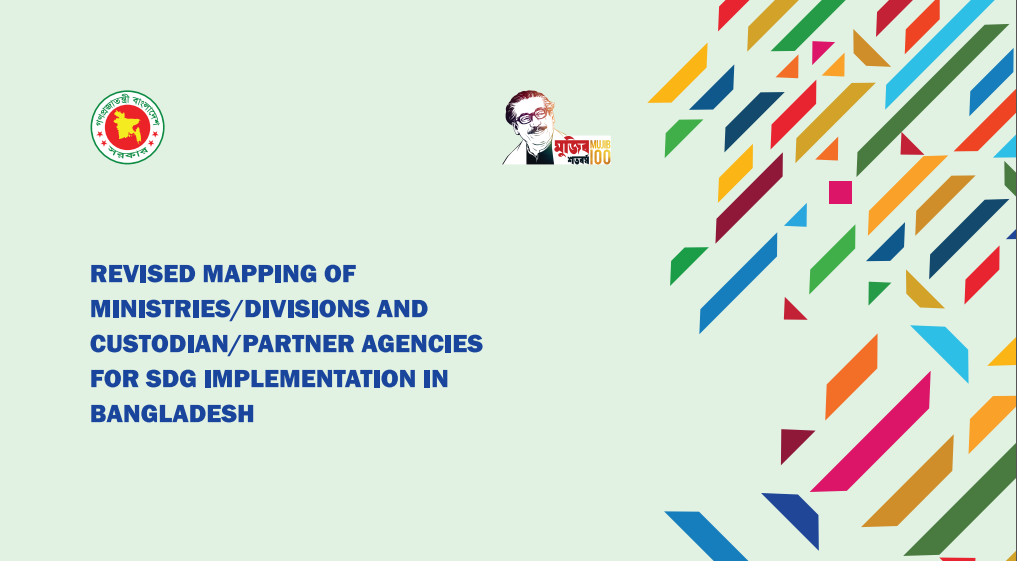
Revised Mapping of Ministries/Divisions and Custodian Partner Agencies for SDG Implementation in Bangladesh
 May 16, 2022
May 16, 2022 The first mapping handbook “Mapping of Ministries by Targets in the implementation of SDGs aligning with 7th Five Year Plan (2016-20)” was first published in September 2016. This document has been revised mainly for four reasons- 1. Global Indicator Framework has been revisited drastically by the UNSD; 2. A number of ministries have been divided into several divisions; 3. Goal-wise coordinating ministry/division has been assigned by the PMO; 4. this mapping is also warranted to be synced with the custodianship of the international agencies as they can provide us with expertise from around the globe in debunking metadata and generation of new data. See the full document here- Revised Mapping of Ministries/Divisions and Custodian/Partner Agencies for SDG Implementation in Bangladesh
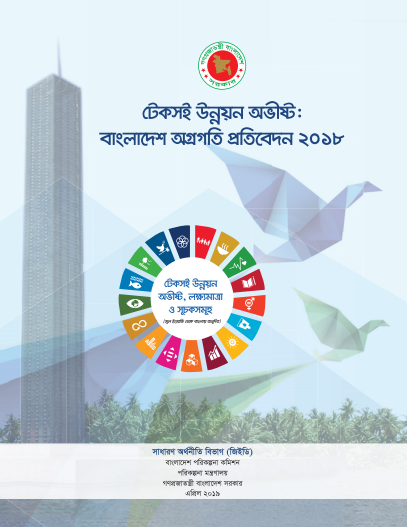
SDGs Progress Report Bangla 2018
 February 19, 2021
February 19, 2021 বাংলাদেশে টেকসই উন্নয়ন অভীষ্ট (এসডিজি) বাস্তবায়নের মূল্যায়ন প্রতিবেদন তৈরিতে একটি পদ্ধতিগত নির্মাণ কাঠামো অনুসরণ করা হয়েছে। এর মধ্যে আছে বাংলাদেশ পরিকল্পনা কমিশনের সাধারণ অর্থনীতি বিভাগ কর্তৃক প্রস্তুতকৃত এসডিজি সম্পর্কিত প্রতিবেদনগুলো এবং সপ্তম পঞ্চবার্ষিক পরিকল্পনা দলিল পুঙ্খানুপুঙ্খ বুঝতে পারা। এই কাজটি করতে গিয়ে বিভিন্ন সংগঠন যথা: বাংলাদেশ পরিসংখ্যান ব্যুরো, জাতীয় পরিসংখ্যান প্রতিষ্ঠান এবং বিভিন্ন মন্ত্রণালয়/বিভাগ থেকে এসডিজির সূচকগুলোর ওপর তথ্য সংগ্রহের জন্য পর্যাপ্ত প্রচেষ্টা নেয়া হয়েছে। তাছাড়া, তথ্য-ঘাটতি দূরীকরণে আন্তর্জাতিক উৎস যথা বিশ্বব্যাংক, জাতিসংঘ এবং ওইসিডির সাহায্যও গ্রহণ করা হয়েছে।
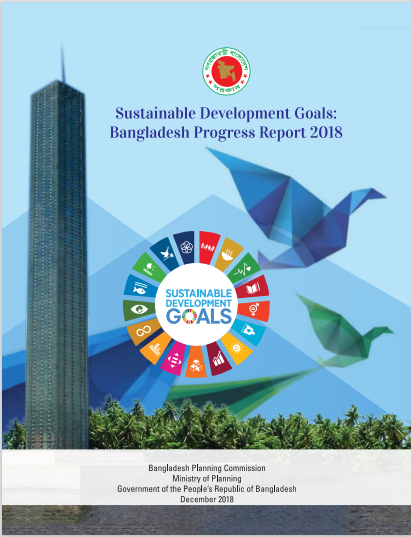
SDG Progress Report 2018.ai English-compressed
 February 19, 2021
February 19, 2021 The progress report on SDGs implementation in Bangladesh has been prepared following a methodological framework. This involves a thorough understanding of the 7th Five Year Plan document, and the documents related to SDGs prepared by General Economics Division of the Bangladesh Planning Commission. Significant efforts were made to gather data on the indicators from Bangladesh Bureau of Statistics, the National Statistical Organisation, and other concerned Ministries/Divisions. Data and information have been also collected from international sources such as the World Bank, the UN and the OECD to fill the data gap.
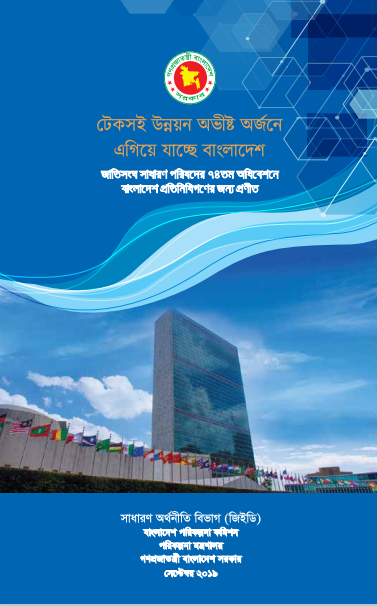
টেকসই উন্নয়ন অভীষ্ট অর্জনে এগিয়ে যাচ্ছে বাংলাদেশ- জাতিসংঘ সাধারণ পরিষদ ৭৪ তম অধিবেশন
 February 18, 2021
February 18, 2021 টেকসই উন্নয়ন অভীষ্ট (এসডিজি) বাস্তবায়নের পথে বাংলােেশর সর্বশেষ অর্জনসমূহ সংক্ষিপ্তাকারে তুলে ধরার জন্য এই পুস্তিকাটি প্রণীত হয়েছে। বাংলাশে ইতোমধ্যে কিছু কিছু ক্ষেত্রে ২০২০ সালের লক্ষ্যমাত্রা অর্জন করেছে, কিছু সূচকের অগ্রগতি ২০২০ সালের লক্ষ্যমাত্রা অর্জনে সঠিক পথে রয়েছে। আবার কিছুসংখ্যক সূচকের অগ্রগতি কাঙ্খিতমাত্রায় আনয়নের েিক বিশেষ নজর েিত হবে। এসডিজির ২৩২টি সূচকের মধ্যে েেশ এ যাবৎ প্রাপ্ত ৮৩টি সূচকের উপাত্ত বিশ্লেষণ করে এই পুস্তিকাটি প্রণয়ন করা হয়েছে। তবে এসডিজি বাস্তবায়ন অগ্রগতি পর্যালোচনার ক্ষেত্রে, বিশেষ করে অভীষ্ট ১১, ১২, ১৩, ১৪ এবং ১৫ এর সূচকগুলোর অগ্রগতি পর্যালোচনার ক্ষেত্রে উপাত্তের অভাব এখনো একটি বিরাট চ্যালেঞ্জ।‘সমাজের সবাইকে নিয়ে’ এগিয়ে যাওয়ার টেকসই উন্নয়ন র্শনকে ধারণ করে বাংলাশে সরকার এসডিজি’র প্রতিটি অভীষ্ট বাস্তবায়নের লক্ষ্যে সুস্পষ্ট পথনির্শেনা প্রানের প্রয়োজনীয় পক্ষেপ গ্রহণ করেছে।আমি প্রত্যাশা করি জাতিসংঘের সাধারণ পরিষরে ৭৪তম অধিবেশনে যোগানকারী বাংলাশে প্রতিনিধিলের জন্য এই লিলটি সহায়ক হবে, বাংলােেশর এসডিজি অর্জনে অগ্রগতি বিষয়ে সম্যক ধারণা। এসডিজি’র এজেন্ডাসমূহ সম্পূর্ণরূপে বাস্তবায়নের জন্য প্রয়োজনীয় অর্থায়ন পর্যালোচনার পাশাপাশি এ যাবৎ প্রাপ্ত বৈিেশক সহায়তার পরিমাণও বিশ্লেষণ করা হয়েছে।
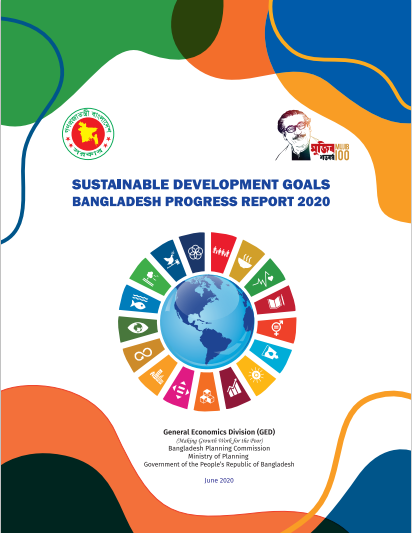
Sustainable Development Goals Bangladesh Progress Report 2020
 February 18, 2021
February 18, 2021 The ‘Bangladesh SDGs Progress Report 2020’ prepares the ground in the lead up to 2019, highlighting how much more effort will be needed to reach the SDGs and meet the commitment to leave no one behind. The preparation process of the Report replicates the similar methodology as adopted in preparing the Bangladesh’s first SDGs Progress Report in 2018. The year 2020 is a critical juncture to reflect on the first four years of the Agenda 2030 implementation and to allow for adjustments to priorities and course corrections. For Bangladesh, it represents a key window of opportunity to inject urgency and catalyse updated or new commitments from all stakeholders – all of which will be necessary if leave no one behind goal and Agenda 2030 are to be achieved.
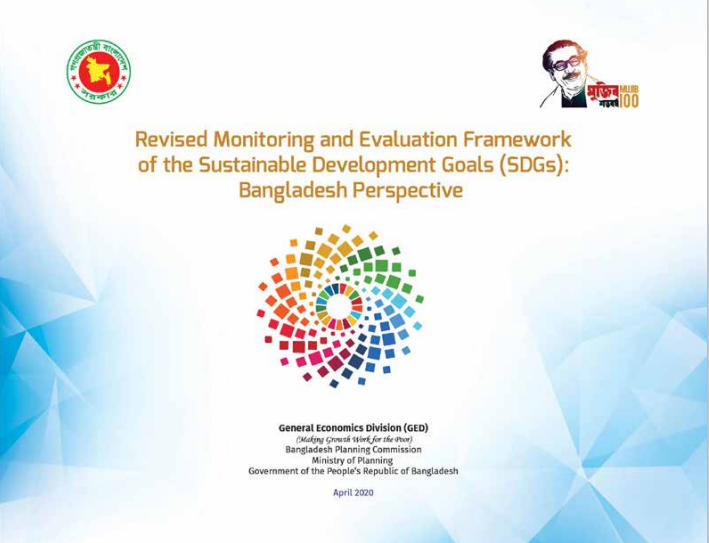
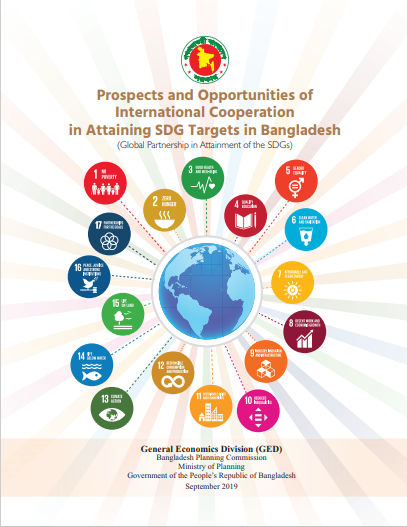
Prospects and Opportunities of International Co-operation in Attaining SDG target in Bangladesh
 February 18, 2021
February 18, 2021 The United Nations (UN) Member States formally adopted the Sustainable Development Goals (SDGs) agenda on 25 September 2015. The 17 SDGs, and its associated 169 targets with 232 indicators, aim to end poverty, hunger and inequality; act on climate change and the environment; improve access to health and education; care for people and the planet; and build strong institutions and partnerships.

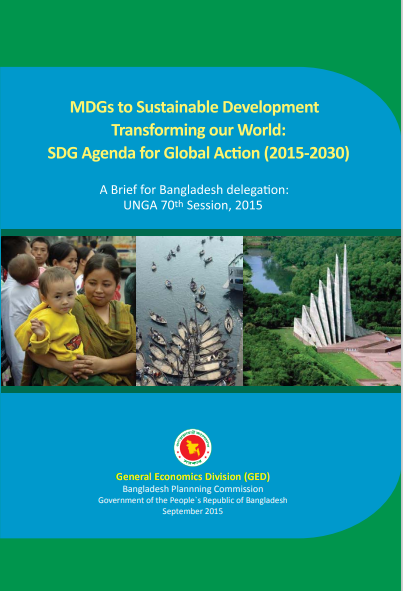
MDGs to Sustainable Development Transforming our World:SDG agenda for Global Action (2015-2030)
 February 18, 2021
February 18, 2021 This booklet on Bangladesh's MDGs achievements and the process of formulation of Post2015 Development Agenda was prepared with the aim to be used by Bangladesh Delegation led by Hon'ble Prime Minister Sheikh Hasina in the 70th UNGA to be held from 15-30 September 2015 in New York, USA.
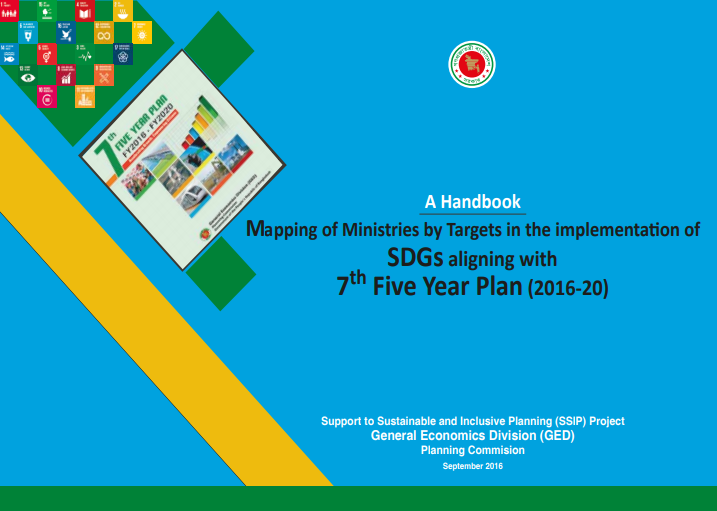
Mapping of Ministries by Targets in the implementation of SDGs aligning with 7th Five Year Plan (2016-20)
 February 18, 2021
February 18, 2021 The inputs for the SDGs’ targets as per 7th Five Year Plan were compiled and analysed to prepare the Handbook by a team led by Mr. Mohd. Monirul Islam, Deputy Chief, GED; other members of the team were Mr. Md. Mahbubul Alam Siddiquee, SAC; Ms. Kohinoor Akter, AC; Syed Ali Bin Hassan, AC; Mr. Shimul Sen, AC; and Ms. Josefa Yesmin, AC of GED. The team had taken the ‘Allocation of Business’ in account to identify the respective Lead and Co-Lead Ministries/Divisions for each of the 169 Targets of SDGs.
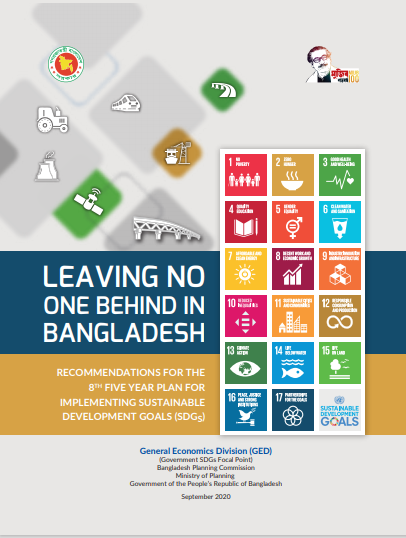
Leaving No One Behind (LNOB) Study
 February 18, 2021
February 18, 2021 Bangladesh has made remarkable progress in terms of institutionalising the SDGs implementation mechanism and developing the integrated policy framework for Agenda 2030. For achieving Vision 2041 and emerging as a high income country by 2041, the country is currently preparing the Perspective Plan 2021-2041 and the 8th Five Year Plan (2021-2025) that aim to ‘leave no one behind’ (LNOB) and promote equitable and inclusive growth and development
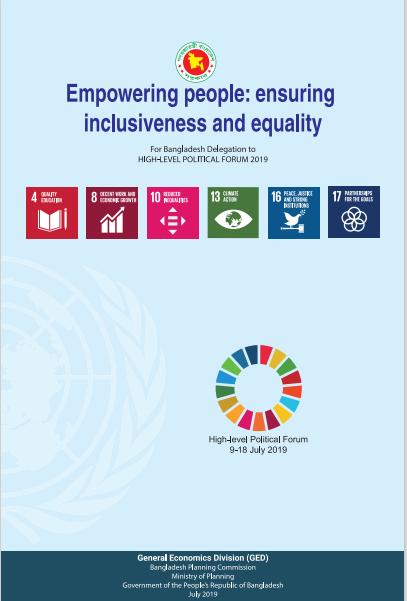
Empowering people: ensuring inclusiveness and equality
 February 18, 2021
February 18, 2021 The government of Bangladesh endorses the notion of citizens’ empowerment as the creation of economic opportunity, the ability to freely choose one’s own path of profession in life in accordance with one’s distinctive talents and abilities.



